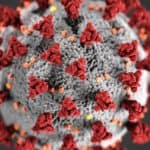1. Widespread underlying SARS-CoV-2 seropositivity was observed in Gauteng province, South Africa, before the omicron wave.
2. Epidemiologic data demonstrated a decoupling of hospitalizations and deaths from infections while omicron was circulating.
Evidence Rating Level: 2 (Good)
Study Rundown: The Omicron variant was first identified in November 2021 in Gauteng province, South Africa, and was designated as a variant of concern due to its predicted high transmissibility and its potential to evade immunity from neutralizing antibodies induced by vaccination or natural infection with wild-type virus. The omicron variant outcompeted the delta variant in Gauteng and was responsible for 98.4% of the cases sequenced in South Africa in December 2021, and a prior population-wide seroepidemiologic study demonstrate that 19.1% of the population was seropositive for Covid-19. However, there is a gap in knowledge as to understanding the seroprevalence of Covid-19 before the omicron wave. This study found that there was widespread underlying SARS-CoV-2 seropositivity in Gauteng before the omicron-dominant wave of Covid-19. This study was limited by changes in the frequency of testing over time which limited head-to-head comparisons of case numbers across waves, and the fourth omicron wave had not fully subsided at the time of this analysis, which will result in a lag in the reporting of data such as hospitalizations and deaths attributable to this wave. Nevertheless, these study’s findings are significant, as they demonstrate that there was widespread seropositivity of Covid-19 in Gauteng prior to the omicron wave and that there was a decoupling of hospitalizations and deaths from infections while omicron was circulating.
Click to read the study in NEJM
Relevant Reading: Omicron — Decoupling Infection from Severe Disease
In-Depth [seroepidemiologic survey]: This seroepidemiologic survey was conducted from October to December 2021 in Gauteng province, South Africa, to determine the seroprevalence of SARS-CoV-2 IgG, obtaining samples from 7010 participants, of whom 18.8% had received a Covid-19 vaccine. Patients who live in the Gauteng province and were able to provide written informed consent were eligible for the study. Patients who resided outside of the studied province or declined to participate were excluded from the study. The primary outcome measured was seroprevalence measured with dried-blood-spot samples and tested for IgG against SARS-CoV-2 spike protein and nucleocapsid protein. Outcomes in the primary analysis were assessed via unadjusted, univariable analyses for each risk factor with generalized linear models with a log link to estimate risk ratios. Based on the analysis, the seroprevalence of SARS-CoV-2 IgG ranged from 56.2% among children younger than 12 years (95% Confidence Interval [CI], 52.6 to 59.7) to 79.7% among adults older than 50 years of age (95% CI, 77.6 to 81.5). 93.1% of vaccinated participants were seropositive for SARS-CoV-2 while 68.4% of unvaccinated participants were seropositive. Epidemiologic data also demonstrated that the incidence of Covid-19 infection increased and subsequently decreased more rapidly during the omicron wave than it had during the three previous waves. The incidence of infection was decoupled from the incidences of hospitalization, recorded death, and excess death during the fourth wave, as compared to the proportions seen in the previous three waves. Overall, this study demonstrated that there was widespread Covid-19 seropositivity in the Gauteng province of South Africa before the omicron wave, showing that there was a decoupling of hospitalizations and deaths from Covid-19 infections while the omicron variant was still circulating.
Image: PD
©2022 2 Minute Medicine, Inc. All rights reserved. No works may be reproduced without expressed written consent from 2 Minute Medicine, Inc. Inquire about licensing here. No article should be construed as medical advice and is not intended as such by the authors or by 2 Minute Medicine, Inc.


